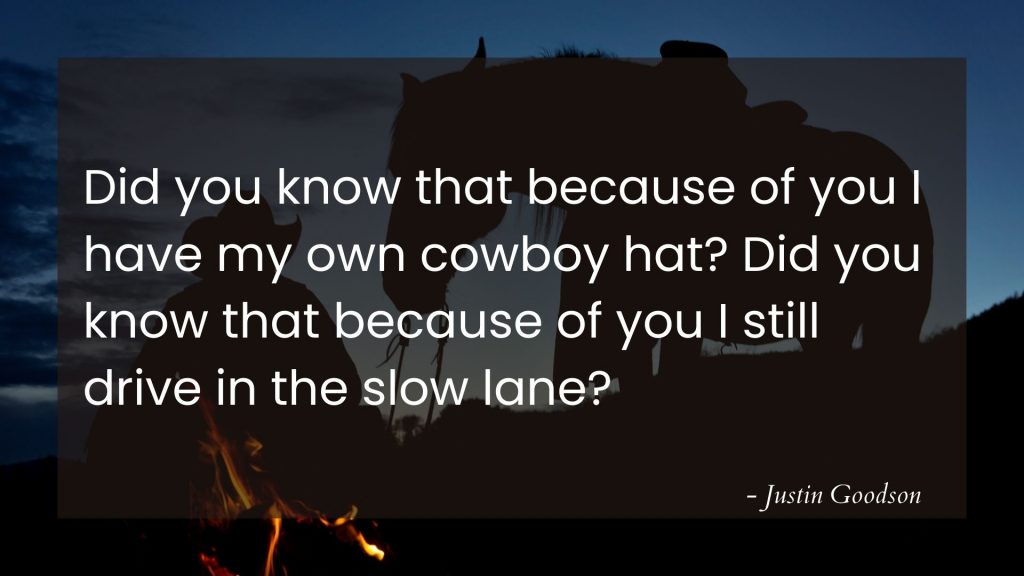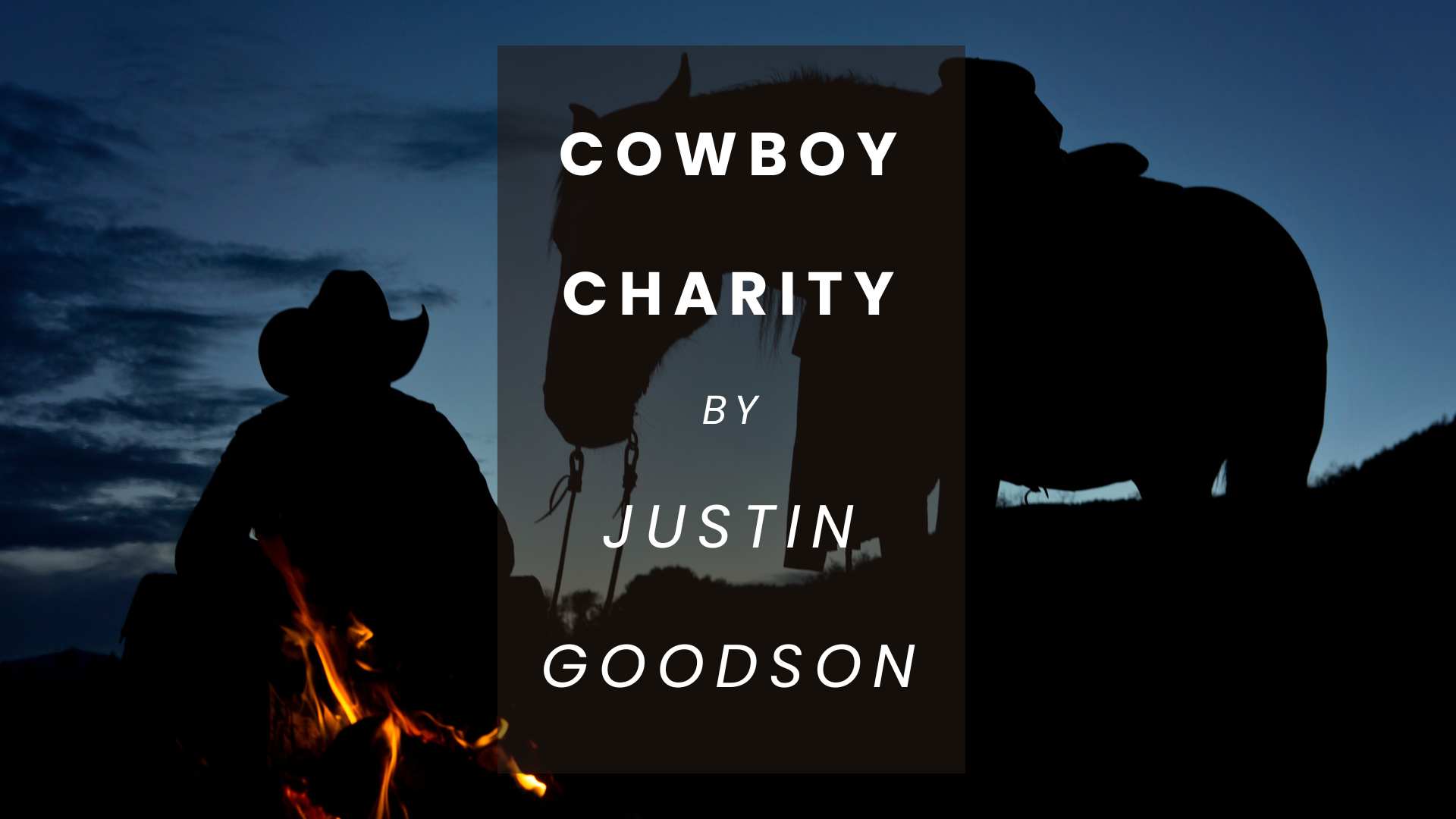Articles/Essays – Volume 57, No. 2
Cowboy Charity
A cowboy from Wyoming taught me everything I know about charity. He taught me that charity is about respecting our shared human experience.
Paul and I were different. Paul was short and round. I was tall and slender. Paul wore boots with steel toes and heels. I wore tennis shoes with insoles. Paul loved guns. He stored them in the glove box and wore them on his hip. Once, when the house caught on fire, his wife called him from the blaze. Paul yelled through the phone, “Forget about the photo albums. Grab the guns!” In contrast, I’m convinced the National Rifle Association is a secret combination. Paul listened to Fox News. I took in a daily dose of National Public Radio. Paul drove a truck with four rear wheels that could tow a trailer full of horses. I drove a minivan with cushy captain’s seats and a bike rack. Despite once serving as an officer of the law, Paul viewed the speed limit as a minimum. I know this because when I caravanned with Paul’s truck through the Bighorn Mountains, pushing my minivan to ninety-five miles per hour was barely enough to keep up. Usually, you’ll find me plodding along in the slow lane. In short, Paul was a cowboy through and through. I was not.
Despite our differences, most of the time Paul and I got along just fine. But on one night, the gap between us led to friction.
The Beaumont Boy Scout Reservation is just west of St. Louis. It sits off Interstate 44, at the top of the hill that overlooks the small town of Eureka and the popular Six Flags amusement park. Most scouts pitch their tents in the reservation’s grassy fields. They’re spacious enough to accommodate hundreds of scouts, fully equipped with trucks, trailers, and giant propane stoves. However, if you’re willing to pack in your gear, and your group is small, Beaumont offers a more authentic camping experience.
Just north of the reservation’s main road, in a grove of pine trees, is an outdoor chapel. Park your car there and hike uphill about half a mile and then across flat terrain for another half mile. Here, high above the main campsites in the fields below, you’ll find an area secluded by thick trees. There’s a makeshift firepit and a few patches of open ground suitable for two-man tents. On a cool autumn evening, this is where Paul and I camped, along with a group of scouts.
After the sun went down and darkness settled in, we all gathered round the fire to keep warm. It was in this setting that Paul made some comments I disagreed with. The young men, including my own sons, overheard. I felt the need to speak up. I voiced my opposition loud enough for all to hear. The whole ordeal didn’t last more than two minutes. As with many squabbles in life, the details are not important. The interaction left me feeling uncomfortable. But I was in the middle of major personal issues and had a hundred other problems pressing down on me, so this incident with Paul was the least of my worries. I brushed it aside and moved on.

One month later, I found myself in the same place with the same group. It was colder and the leaves had fallen from the trees. As I sat in front of the campfire, I felt a tap on my shoulder. “Hey Justin, can we talk for a minute?” Paul asked. We walked down the trail away from the group. Paul stood close to me. In the darkness, I could see the reflection of the campfire flickering in his glasses. “It’s just been eating at me these last few weeks,” Paul said. “I feel bad about the hard feelings between us. I don’t want either of us to feel ill toward the other.”
I hadn’t realized that our disagreement had had such an effect on Paul. He started to choke up. His voice cracked. “I love you, brother. I’m sorry.” The cowboy and the city slicker embraced. Then we walked back to the campfire.
Paul’s brief act of charity didn’t last any longer than our disagreement a month earlier, but it has stayed with me for years. Those few moments next to a campfire on top of a hill just west of St. Louis are burned into my memory. I have not had an experience like it before or since. For context, I was at the lowest point of my life. I was alone, I was profoundly sad, and each day was a struggle. In the middle of my personal chaos, a cowboy from Wyoming showed me human decency. Paul showed me what it meant to apologize and to love another person, even if we still disagreed on certain topics. Paul had no idea what I was facing. He couldn’t have known that healing a small wound would somehow be a balm for much larger injuries. From that moment to this day, I’ve held up Paul’s actions as a model of how kindness can touch a soul.
Not long afterward, Paul and his family moved away from St. Louis. Across the next few years, I often thought that I should write to Paul and thank him, but I procrastinated. By January of 2021 it was too late. Tragically, Paul ended his own life. Unbeknownst to me, Paul had long struggled with mental illness. He also felt alone, profoundly sad, and each day was a struggle. Like a late-stage cancer patient whose efforts to live are ultimately futile, Paul’s condition was terminal. I am under no illusion that writing to Paul would have changed his trajectory, but I regret that I missed an opportunity to reciprocate a cowboy’s charity.
Paul’s apology demonstrated charity from one person to another. Learning about the internal struggles that ultimately ended Paul’s life helped me understand charity more generally. Paul’s belt buckle may have been three sizes bigger than mine, and the brim of his cowboy hat may have dwarfed my baseball cap, but Paul and I were more similar than different. We all are. Across our varying circumstances, we experience similar feelings. I’m not bipolar or schizophrenic or chronically depressed, but my own struggles have allowed me to taste some flavor of these emotions. I may not be able to fully appreciate the depth of chronic mental illness, but my relatively brief encounters with this spectrum of emotions afford enough empathy to open the door to charity. My limited experiences motivate me to show kindness and decency, even if I can’t put all the pieces of another person together or see the full picture of their life.
I imagine this is what it means to have Christlike charity. Jesus didn’t live my life or Paul’s or yours, yet he offers understanding and compassion. Our empathy for others may not run as deep as divine empathy. We may fall far short of fully comprehending another person. Yet, we can “mourn with those who mourn” (Mosiah 18:9). Jesus may have a leg up on us when it comes to succoring all people, but we can “comfort those” in our local circles “that stand in need of comfort” (Mosiah 18:9).
If empathy and mourning and comforting are outside of your wheelhouse, then you can approach charity like Paul approached speed limits. Start with a minimum standard of basic kindness and decency. You’ll find that the difference between Jesus’ own charity and the Christlike charity the rest of us strive for is one of degrees. Despite our differences in personality, circumstance, race, orientation, wealth, intelligence, body weight, genetic predisposition, and on and on, our shared human experience connects us. To be alive and to breathe are the only prerequisites for charity. That’s what I learned from a Wyoming cowboy who sat with me around a campfire.
Paul, I miss you. You showed me charity. Did you know that because of you I have my own cowboy boots? Did you know that because of you I have my own cowboy hat? Did you know that because of you I still drive in the slow lane? Thank you, Paul, for taking a genuine interest in my well-being. On a night that was as cold and as dark as my life at the time, your kind words made all the difference. Brother, I love you, too.
Cowboy Charity was delivered as a talk on March 12, 2023, in the Frontenac Ward of the St. Louis Missouri Stake.


 Back to full Issue
Back to full Issue

